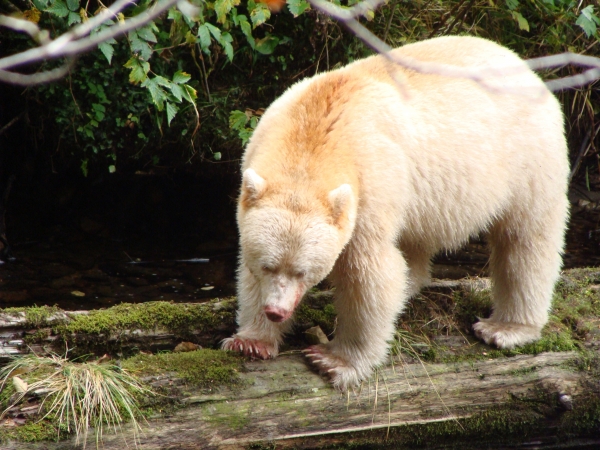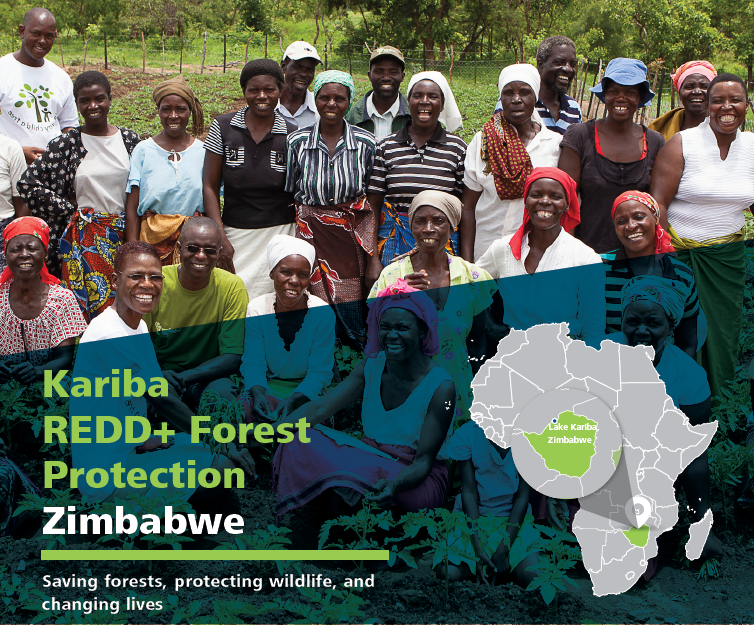

The Kariba REDD+ forest conservation project is located at Lake Kariba in Northern Zimbabwe, connecting several National Parks and Game Reserves such as Chizarira, Matusadona and Mana Pools National Park (which is also a World Heritage Site), and Lower Zambezi National Park in Zambia. The project is aimed at providing sustainable livelihood opportunities for poor communities in Northern Zimbabwe, a region still suffering heavily from deforestation, poverty, and drought. Its aim is to reduce deforestation and forest degradation through a range of activities such as conservation farming, proposed by local communities and supported by carbon finance. Furthermore, the Kariba REDD+ is in an area that has a long history of tourism, and by connecting the three national parks and eight safari reserves, the project area forms a giant biodiversity corridor. The initial hunting safaris have today been turned into ‘photo-safaris’, with visitors coming to the project site to view some of the ‘Big Five’ of the animal kingdom: lions, elephants, buffalos, leopards and rhinoceros.
See also report from 2020: Kariba_General information and Covid
Our solution offers LT&C members, but also tourists in general, the possibility to offset the GHG emissions associated with their travels by investing in a charismatic conservation project – the Kariba REDD+ – that also contributes to specific Sustainable Development Goals. This solution supports pioneering tourism organisations that want to compensate for the global climate impact of travel and further environmental conservation efforts. It also complements the aspirations of the International Year of Sustainable Tourism for Development (IY2017), launched by the World Tourism Organization (UNWTO).
The Kariba REDD+ project in a nutshell:
The Kariba REDD+ forest conservation project is located at Lake Kariba in Northern Zimbabwe, connecting several National Parks and Game Reserves such as Chizarira, Matusadona and Mana Pools National Park (which is also a World Heritage Site), and Lower Zambezi National Park in Zambia. Furthermore, the Kariba REDD+ is in an area that has a long history of tourism, and by connecting the three national parks and eight safari reserves, the project area forms a giant biodiversity corridor. The initial hunting safaris have today been turned into ‘photo-safaris’, with visitors coming to the project site to view some of the ‘Big Five’ of the animal kingdom: lions, elephants, buffalos, leopards and rhinoceros. The project area has a solid tourism infrastructure and also acts as a site for an established revenue sharing scheme based on tourism, called the Campfire project.
The actual Kariba REDD+ project promotes low-carbon growth and empowers local people in sub-Saharan Africa, using the carbon market as one of several sources of main revenue. The quantifiable project activities all work towards achieving the UN Sustainable Development Goals. Up until now, the project has achieved GHG emission reductions of >10 million tons of carbon dioxide equivalent (tCO2e) and is expected to protect the atmosphere from the emission of another 44 million (tCO2e over the next 25 years from reduced emissions associated with deforestation. The project furthermore contributes to the conservation of >7’800 km2 of pristine forests and endemic wildlife and supports community resilience via school infrastructure renovations and school bursaries for pupils. To date, more than 20’000 people are reached and positively affected by the anti-hunger & anti-poverty project activities of improved agriculture and alternative income: the introduction and support for conservation agriculture, honey production and fire prevention measures directly attribute a financial value to standing, living trees; increased agricultural productivity; and alternative cash flows. The driving forces behind the project activities are the local communities in Binga, NyamiNyami, Hurungwe and Mbire, on the Southern shore of Lake Kariba. Their work has led the project to be recognised as a finalist in the 2014 UNCCD’s “Land for Life Award” and UNDP‘s Equator Prize 2014.
We plan to work together with LT&C throughout 2017 to engage key stakeholders and encourage in particular tour operators and individual travellers to address their travel carbon footprint through the Kariba REDD+ project. The Kariba REDD+ Project is the only REDD+ project in Zimbabwe and was the first REDD+ project on community land verified in Africa. Zimbabwe is a Sub-Saharan country with grossly insufficient levels of development aid and ailing private sector engagement. Despite these challenges, the Kariba REDD+ project has managed to become an example of how communities and the private sector can work together, creating real impacts on a large scale within Africa’s poorest communities: it directly supports the Sustainable Development Goals by, among others, protecting the environment, improving infrastructure, ensuring healthier lives, and empowering women by creating livelihood opportunities for them in agriculture, education and project management.
With sufficient finance and recognition, the Kariba REDD+ project activity can be replicated in and outside of Zimbabwe. There are many regions where communities and sustainability professionals could work together on the sustainable management of forests for green growth and eradication of hunger and poverty. The project has the ability to integrate into subnational, national or even international REDD+ and Payment for Environmental Services schemes, once it receives sufficient economic backing.
For more information explore the website of the South Pole Group, website of the Kariba project or look at the Kariba REDD+ project fact sheet: Project_Information-990
© Linking Tourism & Conservation (LT&C) 2019
We are grateful that you support the work and mission of LT&C! We accept donations through Credit Card, PayPal or international bank transfer:

Donate through Credit Card
Please click the Donate button and then choose your PayPal account
Bank details:
Cultura Sparebank
Pb. 6800, St. Olavs plass
N-0130 Oslo
Name: Linking Tourism & Conservation,
Account no.: 1254 05 95168
IBAN: NO8712540595168
BIC/SWIFT: CULTNOK1
Routing BIC: DNBANOKK
Please mark payments with your name and/or email address
Sign up for an LT&C membership by filling in the details below.
Would you like your LT&C-Example/Initiative to be listed on our website? Please fill in the form below.